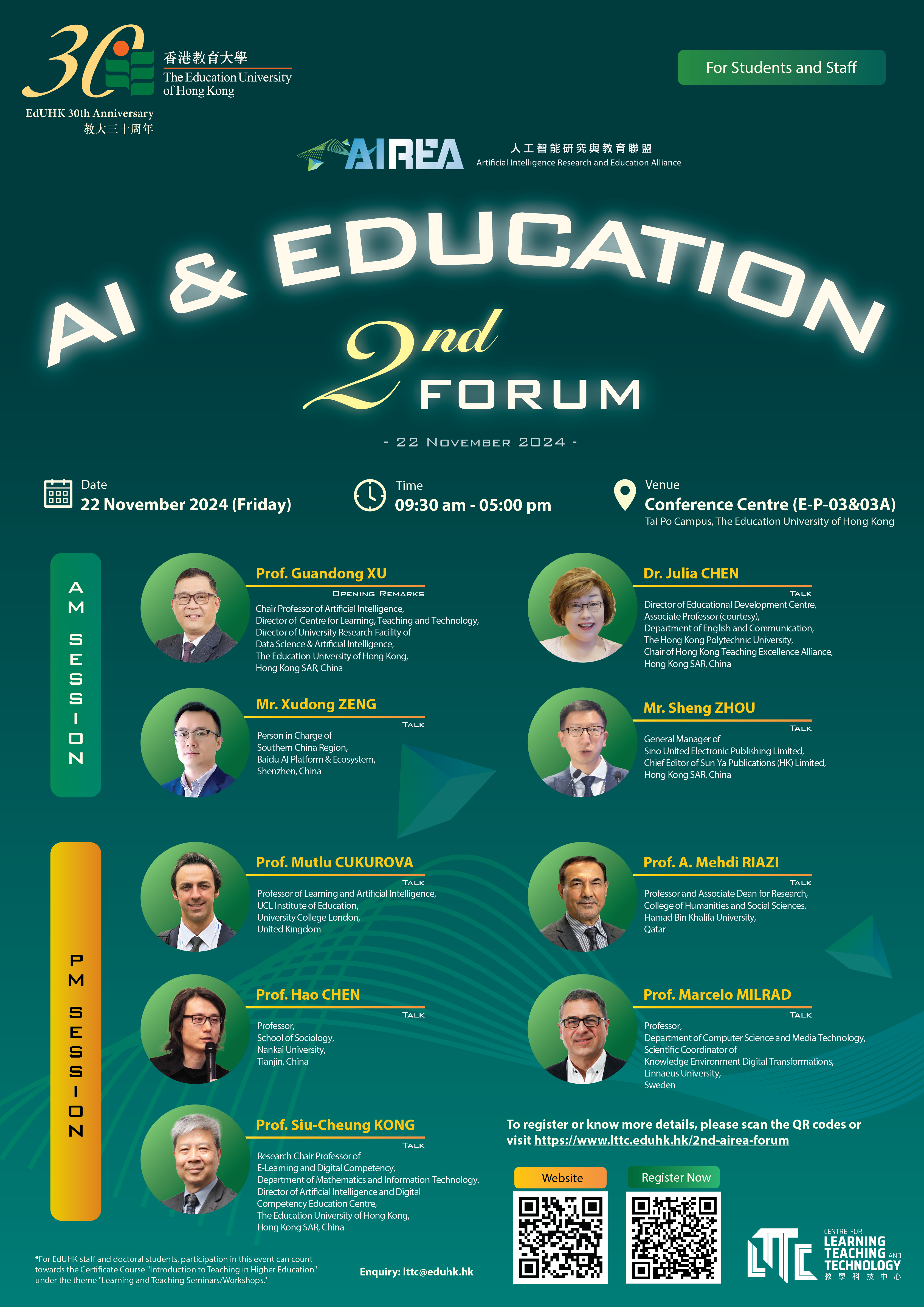Date
22 November 2024 (Friday)
Time
9:30 am to 5:00 pm
Location
(E-P-03&03A)
Tai Po Campus, The Education University of Hong Kong
Rundown
09:30 AM – 10:00 AM |
Registration (AM Session) |
10:00 AM – 11:45 AM |
AM Session |

10:00 AM – 10:15 AM
Opening Remarks
Prof. Guandong XU
Director of Centre for Learning, Teaching and Technology (LTTC),
Director of University Research Facility of Data Science & Artificial Intelligence (UDSAI),
The Education University of Hong Kong,
Hong Kong SAR, China

10:15 AM – 10:45 AM
Invited Talk 1
Topic: GenAI and Education: Current practices and longer-term planning
Dr. Julia CHEN
Director of Educational Development Centre,
Associate Professor (courtesy), Department of English and Communication,
The Hong Kong Polytechnic University,
Chair of Hong Kong Teaching Excellence Alliance,
Hong Kong SAR, China
Abstract
This talk presents some of the current practices of Generative AI in learning and teaching at The Hong Kong Polytechnic University (HKPolyU), and outlines our strategic future planning. As institutions worldwide increasingly integrate GenAI tools into their curricula, HKPolyU has focused particularly on strategies to institutionalise the redesign of assessments, which are high-stakes and can create considerable impact on teaching methodologies, student engagement, and ethical considerations. The talk will highlight successful case studies that demonstrate how the incorporation of GenAI has enhanced the learning experience. Looking ahead, I propose a framework for systematic future planning of integrating GenAI at the governance, pedagogy, and operations levels for the development of techno-competent students for the future. Part of this framework also emphasises collaboration among educators and institutions to enhance faculty capabilities in harnessing GenAI’s potential as a catalyst for innovation and inclusivity in the higher education sector.
Biography of Dr. Julia CHEN
Dr Julia Chen is the Director of the Educational Development Centre at The Hong Kong Polytechnic University. She is recently appointed as the Chair of the Hong Kong Teaching Excellence Alliance initiated by the HK University Grants Committee. A Principal Fellow of Advance HE (PFHEA), her research interests include leveraging technology in education, using learning analytics for quality enhancement, and English Across the Curriculum. She leads several large-scale multi-university projects, including one on GenAI. Julia has won numerous awards: the HK University Grants Committee Teaching Award 2022 (team leader), QS Reimagine Education Awards 2022 Breakthrough Technology Innovation in Education Silver Prize, EdTech Heroes Learning Experience Award 2023, Paper Award in Learning Analytics 2022, and twice her university’s President’s Award for Excellent Performance in teaching and service respectively. She has also been honoured with the lifetime designation of Distinguished Fellow by the Association for Writing Across the Curriculum in the USA.

10:45 AM – 11:15 AM
Invited Talk 2 *
Topic: GenAI and Education: Current practices and longer-term planning
Mr. Xudong ZENG (曾旭東)
Person in Charge of Southern China Region,
Baidu AI Platform & Ecosystem,
Shenzhen, China
(*Putonghua Session)
Abstract in English
Breakthroughs in large language models are driving industrial transformation. With industry upgrades prompting shifts in workforce structures, general knowledge and skills are becoming the most essential competencies to develop for the future. As disciplinary boundaries gradually dissolve, artificial intelligence emerges as one of the fastest-growing employment fields. At the same time, higher standards are being set for general AI education in universities, interdisciplinary AI integration, and the upgrading of AI professional training. This speech aims to provide a comprehensive overview of large model development and the impact of AI on talent demand from an industry perspective. It will explore new technologies and models for industry-academia collaboration in the era of large models, and discuss joint efforts with universities to cultivate versatile AI talent suited for the large model era.
Abstract in Simplified Chinese(摘要,簡體中文)
大语言模型技术突破带动产业变革,产业升级引发人力结构的转变,通识素质成为未来最需要培养的技能、学科壁垒逐渐消融,人工智能成为增长最快的就业方向之一。同时也对高校的AI通识教育、AI与不同学科的交叉融合、AI专业教育升级提出了更高挑战。此次演讲将从企业视角出发,全面介绍大模型产业发展、AI对人才需求的影响,与高校共同探讨AI大模型产教融合新技术与新模式,校企联合培养适合大模型时代的复合型AI人才。
Biography of Mr. Xudong ZENG
Xudong Zeng, the Person in Charge of the Baidu AI Platform & Ecosystem in the Southern China Region, has over 10 years of experience in ecosystem development and operations at leading high-tech companies, including Huawei and Tencent. He is a member of the Shenzhen Smart City and Digital Government Standardization Technical Committee, a guiding expert for the China team in the NSM project of the 45th WorldSkills Competition, and the overall project leader for the 4th and 5th Huawei ICT Competitions. In the field of intelligent manufacturing, he has been awarded 4 patents and 1 software copyright.
曾旭东,百度AI技术生态华南区运营负责人。曾在头部高新技术企业(华为、腾讯)已有10余年的生态建设与运营经验。深圳市智慧城市和数字政府标准化技术委员会委员,第45届世界技能大赛NSM项目中国队指导专家,第4、5届华为ICT大赛项目总负责人,在智能制造领域曾获得专利4项、软件著作权1项。

11:15 AM – 11:45 AM
Invited Talk 3 *
Topic: GenAI and Education: Current practices and longer-term planning
演講主題:如何善用AI提升學校閱讀風氣和學生閱讀素養
Mr. Sheng ZHOU (周晟)
General Manager of Sino United Electronic Publishing Limited,
Chief Editor of Sun Ya Publications (HK) Limited,
Hong Kong SAR, China
(*Putonghua Session)
Abstract in Traditional Chinese(摘要,繁體中文)
閱讀素養是學生全方位發展的重要元素。然而,許多學校都面臨著學生閱讀興趣不足和閱讀能力參差不齊的挑戰。AI在個性化學習、互動式閱讀和數據分析等方面的應用為提升學校閱讀風氣和發展學生閱讀素養提供了解決方案,包括:學生閱讀能力智能測評;智能化圖書推薦;通過數據分析優化閱讀策略;利用AI增強閱讀的參與感和互動性;創建虛擬閱讀社群;組織校際協作閱讀活動等。演講將從以上若干方面提供業內的實踐分享和思考探討。
Biography of Mr. Sheng ZHOU
周晟,聯合電子出版有限公司董事總經理、新雅文化事業有限公司總編輯、香港出版總會理事。「知書閱聽圖書館」、「中華文化有意思」、「3201元宇宙」等文化品牌創辦人。
11:45 AM – 01:45 PM |
Lunch Break |
01:45 PM – 02:00 PM |
Registration (PM Session) |
02:00 PM – 03:30 PM |
PM Session (1) |
![Cukurova_Headshot[24531126]-Transparent-2](https://airea.eduhk.hk/wp-content/uploads/2024/11/Cukurova_Headshot24531126-Transparent-2.png)
02:00 PM – 02:30 PM
Invited Talk 4
Topic: AI in Education: Beyond Intelligent Tutoring Systems to Hybrid Intelligence
Prof. Mutlu CUKUROVA
Professor of Learning and Artificial Intelligence,
UCL Institute of Education,
University College London,
United Kingdom
Abstract
This talk explores the relationship between learning analytics and artificial intelligence (AI) in education, presenting a vision of hybrid intelligence. Rather than limiting AI to the automation of routine pedagogical tasks, this talk reimagines AI’s role in education through three distinctive frameworks: externalization of human cognition to reveal thought processes, internalization to reshape mental models, and the extension of human capabilities through deeply integrated human-AI systems. By unpacking these conceptual models, the talk will uncover the transformative potential—and the inherent challenges—of harnessing AI to enrich human learning, particularly in the context of developing critical 21st-century skills. Drawing on cutting-edge research and practical examples, the talk will illustrate both the promise and the perils of AI applications, addressing their impact on human competence and the risks associated with an overreliance on automated solutions.
Biography of Prof. Mutlu CUKUROVA
Mutlu Cukurova is a Professor of Learning and Artificial Intelligence at University College London. Prof. Cukurova investigates human-AI complementarity in education, aiming to address the pressing socio-educational challenge of preparing people for a future with AI systems that will require a great deal more than the routine cognitive skills currently prized by many education systems and traditional approaches to automation.
He directs the UCLAIT team and leads the Design and Use of AI in Education course. In addition, he is engaged in policy-making activities as an external expert (including UNESCO, IAEA, and EU external expert groups and co-authored the UNESCO AI Competency Framework for Teachers). He was the programme co-chair of the International Conference of AI in Education in 2020, is part of UCL’s Grand Challenges on Transformative Technologies working group, Editor of the British Journal of Educational Technology and Associate Editor of the International Journal of Child-Computer Interaction.

02:30 PM – 03:00 PM
Invited Talk 5
Topic: AIs “R” Us: A Sociocultural Lens
Prof. A. Mehdi RIAZI, PhD
Professor and Associate Dean for Research,
College of Humanities and Social Science,
Hamad Bin Khalifa University,
Qatar
Abstract
The title of this talk playfully references the well-known toy retailer Toys “R” Us, highlighting its belief in the transformative power of play. Just as toys shape children’s lives by fostering imagination, collaboration, problem-solving, exploration, and self-expression, artificial intelligence (AI) is emerging as the defining “toy” of our era. While traditional toys engage children’s imaginations, AI now captivates audiences of all ages, from children to adults, serving as companions that influence our identities and interactions.
In this presentation, I will apply sociocultural theory, particularly Vygotsky’s concept of the zone of proximal development (ZPD), to explore the implications of AI on cognitive development. The ZPD posits that cognitive growth occurs within the context of social interaction, where learners are supported by more knowledgeable others—be they teachers, peers, or, increasingly, AI. This shift in who or what provides support—from human enablers to AI-driven tools—raises critical questions about the nature of learning and development in our increasingly digital world.
I will examine how AI acts as scaffolding for learners, providing tailored assistance and resources that can enhance cognitive growth. However, this transformation also brings challenges: How will reliance on AI affect critical thinking, creativity, and interpersonal skills? What are the potential risks and benefits of this new relationship between humans and AI?
By addressing these questions, I aim to shed light on the socio-cognitive implications of living with AI as a central part of our educational and developmental environments. Ultimately, I will encourage a dialogue about how we can navigate this shift thoughtfully, ensuring that AI enhances rather than diminishes our cognitive and social development.
Biography of Prof. A. Mehdi RIAZI
A. Mehdi Riazi holds a Ph.D. in education (with a major in applied linguistics) from the University of Toronto. He worked at Shiraz University (Iran) and Macquarie University (Australia) and is currently Associate Dean for Research and Ph.D. Program coordinator in the College of Humanities and Social Sciences of Hamad Bin Khalifa University (Qatar). He is also the coordinator of “AI in Higher Education Research Group” at HBKU. He has contributed to various areas, including assessment and evaluation, teaching methodologies, and the intersection of technology and education. His most recent view on AI in education is “Redefining Teaching and Learning in the Age of AI” (https://www.al-fanarmedia.org/2024/08/redefining-teaching-and-learning-in-the-age-of-ai/). He is also interested in the intersection of research methodology and knowledge production and what counts as quality research and, by extension, legitimate knowledge.

03:00 PM – 03:30 PM
Invited Talk 6
Topic: Large language models have their own response preferences on important human issues
Prof. Hao CHEN
Professor,
School of Sociology,
Nankai University,
Tianjin, China
Abstract
Large Language Models (LLMs) are increasingly employed as human assistants across various domains. Consequently, humans often encounter challenges related to the inconsistent or unpredictable value orientations and response tendencies exhibited by LLMs. By constructing a virtual QA platform and adopting a psychological research paradigm, we analyzed the response characteristics and priority preferences of three representative LLMs: GPT-4, GPT-4o, and LLAMA, on significant human issues. The studies revealed that while LLMs’ responses are somewhat influenced by peer pressure, they predominantly exhibit their own prioritized response tendencies. For instance, they tend to prioritize issues related to science and technology, medicine and health, climate changes, and artificial intelligence, while overlooking areas such as business and economics, arts and culture, history, and philosophy. Furthermore, we employed Self-Determination Theory (SDT) from psychology to explore the underlying causes of these preferences. Preliminary findings suggest that LLMs are driven by motivations similar to intrinsic and extrinsic motivations. These insights are crucial for understanding the cognition and decision-making processes of LLMs and have significant implications for enhancing human-AI collaboration.
Biography of Prof. Hao CHEN
Dr. Hao CHEN is a professor in the Department of Social Psychology at the School of Sociology, Nankai University. He also serves as a part-time master’s supervisor at Sun Yat-sen University and Tianjin University, and was a Fulbright Visiting Scholar at the University of Texas at Austin. His research interests encompass big data analysis of psychological and behavioral patterns, computational and experimental social psychology, online collective emotions and behaviors, and evolutionary psychology.
As a pioneering participant in China’s National Key Basic Research Development Program (973 Program) focused on computational social science in the early 2010s, Hao Chen has been at the forefront of advancing the integration of big data technology with traditional research issues in the social sciences and psychology. He has published over 80 papers in prestigious international journals such as Personality and Social Psychology Bulletin (PSPB), Journal of Experimental Social Psychology (JESP), Journal of Personality (JoP), Social Psychological and Personality Science (SPPS), and Cyberpsychology, Behavior, and Social Networking, as well as in leading Chinese journals like Acta Psychologica Sinica, Sociological Studies, and Systems Science and Mathematics. Additionally, he has authored three monographs on big data psychology.
Currently, Hao Chen serves as a council member of the Chinese Association of Social Psychology and chairs the Big Data and Cyberpsychology Committee within the association. He is also a member of the BESC Steering Committee and the Social Computing and Social Intelligence Committee of the Chinese Association for Artificial Intelligence. Furthermore, he chaired the Psychology Track and the Psychology Special Forum at the BDSC2024 Social Computing Innovation Competition and serves as the Program Committee Chair for BDSC2025, both organized by the Chinese Association for Artificial Intelligence.
03:30 PM – 03:45 PM |
Tea Break |
03:45 PM – 04:45 PM |
PM Session (2) |

03:45 PM – 04:15 PM
Invited Talk 7
Topic: The Transformative Potential of Generative AI in Education: Opportunities and Challenges
Prof. Marcelo MILRAD
Professor,
Department of Computer Science and Media Technology,
Scientific Coordinator of Knowledge Environment Digital Transformations,
Linnaeus University,
Sweden
Abstract
As educational landscapes evolve with the advancement of digital technologies, artificial intelligence (AI) is emerging as a powerful force for transformation. Generative AI, a subset of AI, presents unprecedented opportunities to support self-regulated learning, facilitate collaboration, and foster creativity. In this talk, I will examine the implications of generative AI in education, emphasizing its potential to boost student engagement through personalized learning experiences. With AI-driven tools, students can collaborate with digital agents, engage in dynamic learning environments, and receive real-time feedback that deepens their understanding. However, these benefits are accompanied by challenges that demand careful consideration, including ethical concerns, the risk of over-reliance on technology, and the need for educators to adapt their teaching methods. This discussion will highlight the importance of a balanced approach, where educators leverage the capabilities of generative AI while promoting critical thinking, creativity, and human interactions — ultimately ensuring that AI can serve as a catalyst for educational innovation rather than diminishing our intellectual abilities.
Biography of Prof. Marcelo MILRAD
Marcelo Milrad is a Full Professor of Media Technology at Linnaeus University. His research encompasses the fields of Technology-Enhanced Learning, advanced human-computer interaction, and innovative applications of Artificial Intelligence in education and health care. Since March 2020, professor Milrad serves as the main scientific coordinator of LNU’s Digital Transformations knowledge environment where he leads multidisciplinary research and fosters collaboration across various fields. He closely collaborates with industrial partners and the public sector, facilitating the implementation of cutting-edge technologies. Currently, he leads the EU-funded project Extending Design Thinking with Digital Technologies (2022-2025, €3.2 million), which aims to integrate digital tools into design thinking processes.
Professor Milrad has published more than 250 articles in international journals, refereed conferences and books. He has also been giving lectures about his work in more than 45 countries worldwide. Dr. Milrad’s multidisciplinary scientific approach aims to advance academic research while bridging the gap between theoretical knowledge and practical applications, with the potential to significantly impact real-world educational practices.

04:15 PM – 04:45 PM
Invited Talk 8
Topic: Leveraging Generative Artificial Intelligence Tools to Cultivate Higher-Order Thinking Skills: Practical Examples for Secondary Students, University Students, Teachers and Parents
Prof. Siu-Cheung KONG
Research Chair Professor of E-Learning and Digital Competency at
the Department of Mathematics and Information Technology,
Director of Artificial Intelligence and Digital Competency Education Centre,
The Education University of Hong Kong,
Hong Kong SAR, China
Abstract
The potential of using generative artificial intelligence (AI) tools to cultivate higher-order thinking skills lies in their resourcefulness and affordances. It is widely acknowledged that generative AI tools are resourceful but do not always deliver responses as anticipated by human prompters; therefore, they can serve as valuable resources for offering affordances that aid in the development of higher-order thinking skills. These skills are paramount for individuals in the age of the Fourth Industrial Revolution, where solving complex problems alongside AI will become commonplace and necessitate extensive development. In this presentation, I will provide examples that demonstrate how to leverage generative AI tools to advance domain knowledge acquisition for the cultivation of self-regulated learning (SRL) skills among secondary and university students. Additionally, I will provide examples that elucidate how teachers and parents can devise human-centric pedagogical approaches to foster the development of students’ higher-order thinking abilities.
Abstract in Traditional Chinese (摘要,繁體中文)
生成式人工智能工具培養高階思維能力的潛力,源於其豐富的資源及其所提供的可能性(affordances)。儘管生成式人工智能工具的回應並非總是如提問者所願,但其豐富的資源仍能有效促進學生高階思維能力的發展。高階思維能力在第四次工業革命的時代對每個人都十分重要,因為人與人工智能共同解決複雜問題將成為常態,需要著力的發展。我將在本次報告中提供範例,說明如何運用生成式人工智能工具支持中學、大學生學科知識學習的過程發展學生的自主學習能力,亦會說明教師及家長可如何設計教學法發展學生高階思維能力。
Biography of Prof. Siu-Cheung KONG
Professor KONG Siu Cheung is currently a Research Chair Professor at the Department of Mathematics and Information Technology (MIT) and Director of the Artificial Intelligence and Digital Competency Education Centre (AIDCEC) at The Education University of Hong Kong. Professor Kong serves as the Editor-in-Chief of the international journal Research and Practice in Technology Enhanced Learning (RPTEL) and Journal of Computers in Education (JCE). He is serving as the President of the Global Chinese Society for Computers in Education (GCSCE) from July 2023 to June 2025. Professor Kong is on the Stanford Top 2% Scientist in Education list from 2019 to 2024. He won the 2019-2020 HKSAR University Grants Council Teaching Award (Team Award). He won The Education University of Hong Kong President’s Awards for Outstanding Performance in Administration (Team Award) in 2021 and 2024. Professor Kong is leading an international project promoting coding education for computational thinking development from 2016 to 2025. He is also leading two projects on Artificial Intelligence Literacy education for senior primary and junior secondary students in Hong Kong and France; senior secondary students, university students, school teachers and parents, and administrative staff at workplace in Hong Kong from 2020 to 2026. He is the proposed programme leader of the newly developed and initially approved Master of Science in Artificial Intelligence for Executive Professionals [MSc(AIEP)] programme at the Education University of Hong Kong, pending final approval.
04:45 PM – 05:00 PM |
Closing and Announcements |





